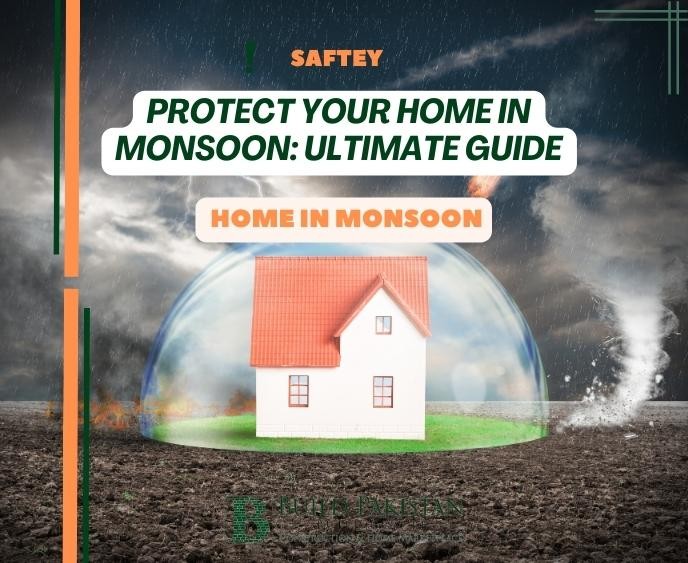Protect your Home in Monsoon: Ultimate guide

Introduction:
The monsoon season in Pakistan lasts from the end of July until the beginning of September. Each area of the country experiences a different quantity of rainfall. Since it brings down temperatures and offers a welcome break from the summer's extreme heat and dry spell, many people like the cool, wet weather.
In addition to a welcome seasonal change, the amount of
moisture in the air greatly rises during the rainy season. If you haven't taken
the essential steps to stop seepage and wall moisture concerns, this might harm
both the inside and outside of your house.
Hence, if you're seeking for strategies to safeguard your
property throughout the rainy season, we can assist you. We've compiled the top
10 advice in this article to assist you with monsoon house preparation.
SUGGESTIONS FOR MONSOON HOME PREPARATION
VERIFY YOUR WALLS:
Your home's walls may have cracks that allow water to leak in, which promotes the growth of fungi. This not only harms your health but also risks causing foundation and wall damage. It is essential to get any cracks in your home inspected. Hire assistance if you can't finish it on your own. One of the greatest monsoon home maintenance advice is to weatherproof your house.

Examine the outlets:
To see if your home's pipes are clogged, you need also
inspect them. This is significant because puddles can occur in closed
pipelines. These standing water patches quickly turn into a haven for mosquito
breeding. To keep your home from flooding during rain, don't forget to clear
out any dirt or debris and unclog any pipes. To prevent any future difficulty,
you should also plug any pipe leaks.
VERIFY YOUR ROOF:
Your home's roof is in charge of shielding you from any dangerous weather conditions. But, replacing a damaged roof can occasionally be rather expensive. Homeowners should continue to examine their roof (at least twice a year) to spot any issues that may later get worse. Apart from the outside, be sure to inspect your ceiling.
The rainy season will inevitably result in constant leakage
from any gaps in your roof. Employ experts to examine all roof fractures and
leaks on your house. Your roof can also be coated with a waterproof material to
make sure that there are no issues during the severe rainy season. In case you
need to repair your home's roof, here are a few ideas.
FIX BLOCKAGE IN GUTTERS:
Cleaning your gutters is a crucial step in preparing your
property for the rain. Remove any dirt, trash, leaves, or other obstructions to
the water's flow immediately. The accumulation and overflow of water brought on
by clogged gutters results in substantial damage. A portion of this water will
eventually leak through the walls of your house. If you put off fixing this
issue, you risk causing property damage and eventually paying expensive
maintenance fees.
ADD SLOPING EFFORT:
Your home should ideally not have any flat places where rainwater may collect and stagnate. Nobody hates to watch their young children or elderly parents fall and be harmed. Each region where water tends to accumulate has to have a temporary slope created.
Verify the electrical fittings:
Before the rainy season begins, it's a good idea to employ an
electrician to inspect all electrical fittings. This is due to the possibility
that damaged switches or unsecured wiring might result in an unexpected event
during the rainy season. Particularly if you have kids at home, make careful to
wrap up any exposed wires to prevent unpleasant shocks.
Examine the windows and doors:
We frequently forget about our home's doors and windows. But
both of these are typical entry places for rainfall into your home. Check to
see if your windows and doors are opening and shutting correctly. To
weatherproof all access points and protect your home from the rain, use a
high-quality sealer. In fact, weatherproofing these two parts of your house
will also aid in reducing your summer energy costs.
HAVE YOUR SAFETY SET AVAILABLE:
A safety package during the monsoon season is different from a standard first-aid kit. Water cans, non-perishable food, a torch, batteries, a portable generator, and other essentials should be included in your monsoon preparedness kit. These items will be necessary if monsoon rains are stronger than predicted or if you have to withstand a power outage.
If you have young children at home, have a supply of wet
wipes, insect repellents, and a functional phone on hand. If your landline goes
down, it is essential to have a phone with a long battery life so you can
contact for assistance in an emergency.
REMOVE DISPLEASANTS SMELLS:
During the rainy season, homeowners are accustomed to smelling wetness in their houses. Making a vinegar and lemon juice mixture is one of the most popular home care advice during rainy season. To get rid of any unpleasant odours, store it in a container and spray it all over your house. During the rainy season, you may also store neem leaves or camphor balls in your closet to protect your clothing from unpleasant odours or fungal development.
BE SAFE WITH YOUR WOODEN FURNITURE AND CARPETS:
The rainy season may do serious damage to your pricey
carpets. Your rug's delicate fabric is porous and readily absorbs moisture.
Your carpets should ideally be kept in a secure location while being rolled.
READY YOURSELF FOR SURPRISE:
Keep your devices and appliances up off the ground. Laptops and other electronic devices should also be stored safely and away from windows. Also, prune and trim your trees to prevent accidents. No matter how solid your home's structure or foundation is, you might anticipate a few surprises during the rainy season.
There are certain aspects of your house that are out of your
hands. Yet, if you stick to these monsoon home care advice, you can keep your
house dry during downpours and thunderstorms.


















